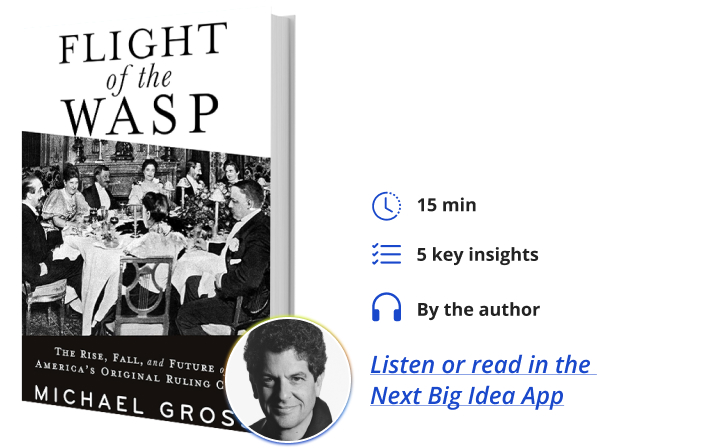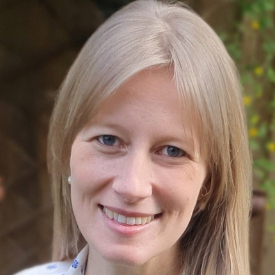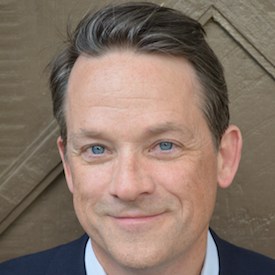Michael Gross is a writer and editor whose work focuses on the upper class. A contributing editor of Departures, he’s written for Vanity Fair, Esquire, GQ, Town & Country, the New York Times and authored twelve books.
Below, Michael shares five key insights from his new book, Flight of the WASP: The Rise, Fall, and Future of America’s Original Ruling Class. Listen to the audio version—read by Michael himself—in the Next Big Idea App.

1. Who are the WASPs?
The acronym for White Anglo-Saxon Protestants is a bit of a misnomer. Most of the first American colonists were white and Protestant, but they were not all English. England’s Anglo-Saxons came from today’s Germany, Denmark, and the Netherlands and were heavily influenced by the Celts, Romans, and Norman French. All they initially shared was the Reformation, which began as a religious movement in Germany and added a political dimension as it spread across Western Europe to America.
It included the Puritans, who settled New England and parts of the Mid-Atlantic Coast, the English-born Anglicans who first colonized Virginia and Maryland; French Huguenots scattered all along the Atlantic coastline; Dutch Reform church members, who settled Nieuw Amsterdam; and Pennsylvania’s Quakers.
2. WASPs tell a crucial slice of American history.
They are the protagonists in the creation of a nation and a national ethos, as well as the shame and stain left by the practice of slavery, the oppression of Native Americans, and systemic racism, intolerance, and misogyny. In both their accomplishments, and the betrayal of their ideals, they illuminate America’s transformations in the four hundred years since the Mayflower’s arrival. Despite the manifest weaknesses and multitude of sins of America’s WASP elite, they have reason for pride. Though their values were too often more honored in the breach than the observance, they did define an enduring American ideal, a national character that respects and elevates tradition, leadership, service, honor, duty, modesty, restraint, stoicism, moral authority, courage, grace, noblesse obliges, cultivation, humility, responsibility, lack of pretension, or, boiled down to their collective essence: simple civility.
America’s WASPs also aspired to civic virtue, setting high standards in government, business and other spheres of public life as they built national institutions and industries, innovating as well as exploiting in government, law, finance, transportation, agriculture, commerce, defense, education, energy, health, urban development and philanthropy. But WASP selfishness and arrogance, vanity and thirst for power too often negated those enduring accomplishments. Their prideful belief in their own perfectibility led to their downfall as the stain of their embrace of slavery, genocide, and sexism, and their abject misuse of their sweeping social and economic power spread, darkening their story, sapping their energy, depleting that power, and finally, taking it from them.
“WASP selfishness and arrogance, vanity and thirst for power too often negated those enduring accomplishments.”
Flight of the WASP has ten lead characters. It begins with William Bradford, a religious dissenter who left England for the Netherlands before sailing to Massachusetts on the Mayflower and becoming the first and longtime Governor of the Plymouth Colony, as well as its largest landholder.
Gouverneur Morris is a reluctant revolutionary, lascivious libertine and least-known Founding Father. As primary author of the U.S. Constitution, he became the new nation’s ambassador to France before and during its Revolution. Back in America, he speculated in real estate while also helping plan New York City’s street grid and the Erie Canal.
John “Jack” Randolph is scion of one of Virginia’s fabled First Families. He was a deeply conflicted slave owner who railed against human bondage but never freed a single one of his slaves. He was also gender-fluid, an on-and-off drug addict, and the fiercest advocate of state’s rights in the U.S. Congress, who would later be proclaimed the father of modern American conservatism.
Nicholas Biddle was offspring of prominent Quakers. He was erudite, handsome and highly social. He edited the journals of Lewis & Clark and a literary magazine. He championed neo-classical design after becoming the second American to ever visit Greece. Biddle then ran the Second Bank of the United States, forerunner of today’s Federal Reserve, where he ran afoul of the anti-elitist President Andrew Jackson, who destroyed his reputation before Biddle died in disgrace.
Lewis Cass was the longtime governor of the Michigan Territory and author of Jackson’s brutal policy of pushing Native Americans onto reservations west of the Mississippi River. Before the Civil War, he was a Northern Democrat who became a pro-slavery candidate for President of the United States.
Henry Shelton Sanford was a New England carpet and tack heir who founded America’s first overseas espionage network for President Lincoln during the Civil War. But by trying to support an extravagant lifestyle, he repeatedly failed in business, and finally, enabled King Leopold of Belgium’s theft and rape of the African Congo. Yet Shelton was the first to see the potential of Florida’s tourism and citrus industries.
George Peabody epitomized greed and accumulation, but also became one of America’s first philanthropists. The father of today’s JPMorgan Chase banking behemoth, he gave J. Pierpont Morgan his start in business. But then, he reneged on a promise to let Morgan use his name and his fortune, giving it away, instead.
“When America’s forty-first president, George H. W. Bush, died in 2018, his passing set off a torrent of WASP nostalgia.”
William Collins Whitney’s family married into the Bradfords, setting him on a course to power and wealth. He was the modernizer of the U.S. Navy, then a behind-the-scenes political fixer and one of the founders of New York City’s transit system. Finally, he’d be remembered as the founder of one of America’s greatest inherited family fortunes of the Gilded Age.
Henry Fairfield Osborn was an eminent paleontologist who headed the American Museum of Natural History for decades, made it a world-class institution, but destroyed his own reputation by embracing eugenics, the pseudo-science that sought to legitimize white supremacy, and Adolf Hitler’s Nazis.
Michael Butler was the bisexual scion of the family that created the Butler Paper and Butler Aviation empires. He romanced Audrey Hepburn, Rock Hudson and Tyrone Power, married and divorced three times, produced the Broadway phenomenon “Hair,” but followed that undeniable accomplishment with decades of hair-brained schemes that led to his ignominious bankruptcy.
3. Are WASPs irrelevant today?
Obituaries for the American WASP began appearing with regularity in 1960s, and certainly they are no longer the dominant socio-cultural-political force in America that they once were. Yet, when America’s forty-first president, George H. W. Bush, died in 2018, his passing set off a torrent of WASP nostalgia, mourning the loss of WASP virtues that gave voice to a yearning for a revival of the ideals of the Enlightenment that were the foundation of the American national experiment.
4. How do contemporary members of these families approach their WASP inheritance?
Since the late twentieth century, members of these families have taken three paths into the future—self-indulgence, escape, and engagement—sometimes staying on one, sometimes changing direction. Not surprisingly, the results have varied.
Whitney Tower Jr., a descendant of William Bradford, became a degenerate drug addict, and then a drug counselor.
Scions of Gouverneur Morris and Nicholas Biddle, the controversial head of the Second Bank of the United States, are proudly gay.
“Since the late twentieth century, members of these families have taken three paths into the future—self-indulgence, escape, and engagement.”
Penelope Tree and Frankie FitzGerald, both relatives of George Peabody, are respectively a Buddhist fashion icon and a Pulitzer Prize winning journalist and author. Their great grandfather founded Groton, the elite boarding school, their grandmother was arrested in a Civil Rights protest, and their mother ignored them, preferring her life as a socialite, Democratic activist and presidential candidate Adlai Stevenson’s lover.
Gertrude and Bokara “Bobo” Legendre, the grand-daughter and great-granddaughter of Henry Shelton Sanford, lived off what remained of their family’s fortune. Gertrude, a big game hunter, was captured and briefly imprisoned by the Nazis. Bobo, the daughter she alternately ignored and manipulated, became a quintessential WASP dilettante.
Generations after Henry Fairfield Osborn destroyed his reputation by championing racism, his relative Frederick Henry Osborn III became a pillar of the Episcopal Church and a noted philanthropist.
5. What role might the best WASP virtues play in America’s future?
We live in a sociopolitical moment that’s normalized tribalism, anger, emotion, blind loyalty, and a generalized lust for retribution. The body politic is full of poison. We can’t board a plane, stand on a checkout line, eat in a restaurant, or walk down the street—let alone talk about politics or social policy—without getting into arguments. WASPs argued too, as they won and exercised their power over more than three centuries in America, and over the course of fifteen generations, they husbanded, spent, and then frittered away their capital, both financial and otherwise, until they were considered irretrievably broken, if not entirely broke, at the dawn of the 21st century.
It may be counter-intuitive, but my study of the WASP families that have endured it all argues for a renewed appreciation of some white Anglo-Saxon Protestant virtues. There is an opportunity for the WASPs, that ever-smaller percentage of the citizenry, to remind America of its foundational ideal. There is a yawning void where the best of WASP culture might make a difference again. Instead of injecting more poison into the body politic, the sting of the WASP could now serve as an antidote, reminding us that there is an alternative to our present selfish, narcissistic, tribal, atomized condition, a possibility of restoring America’s civic conscience, collective purpose, and national community.
To listen to the audio version read by author Michael Gross, download the Next Big Idea App today:
































